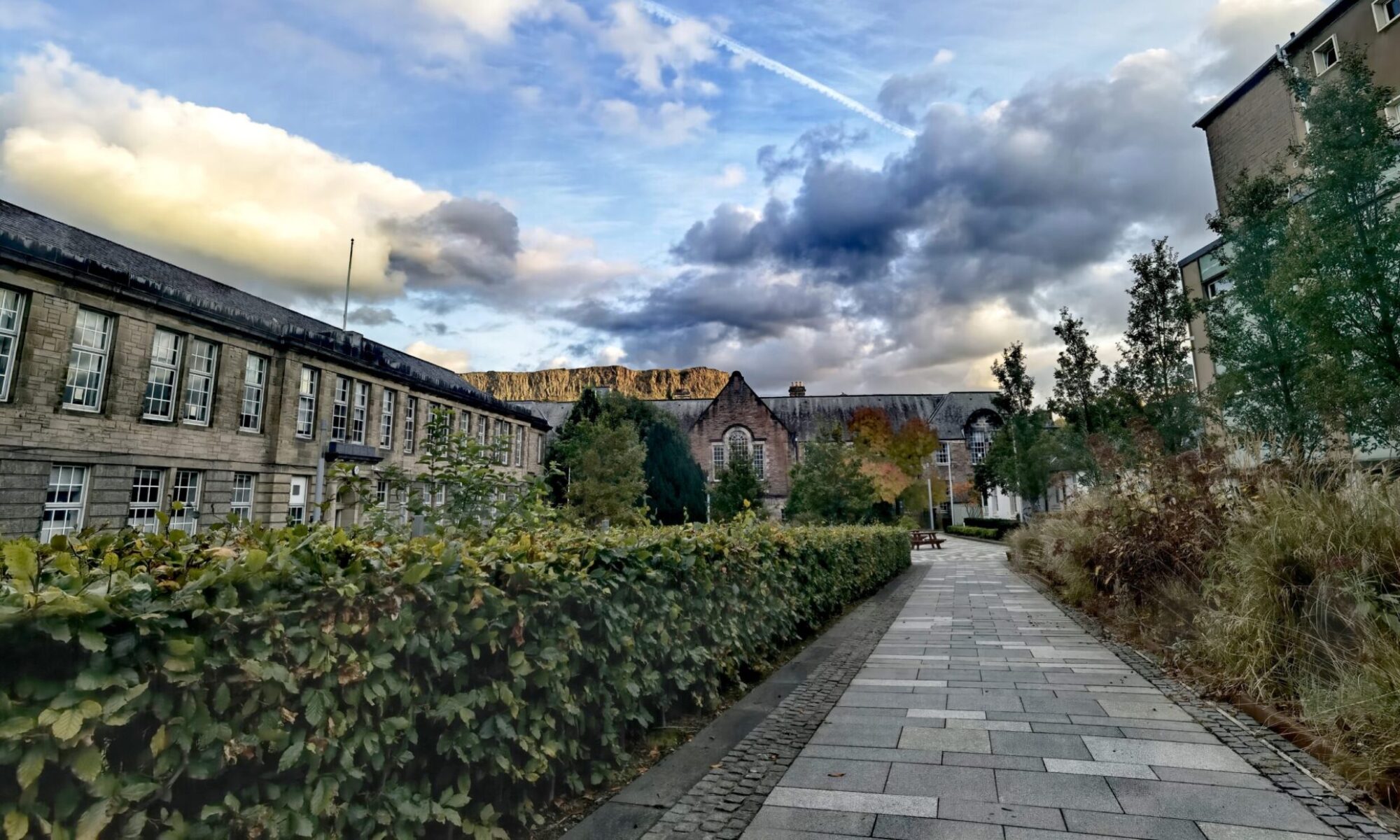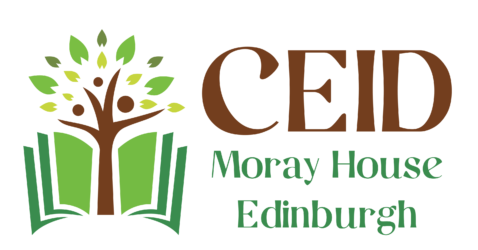Seeing your name on your first publication can be an amazing feeling. I published my first work during my masters degree at the University of Denver and am excited to help some of our students succeed. During my time at Moray House, I’ve enjoyed collaborating with CEID students and alumni and found ways to increase these opportunities. Since we launched the MSc CEID programme, I’ve asked for volunteers to join me in a research group where we work together throughout the year to craft an academic publication. In this annually created research group, we work and learn together, discussing not just the specific content but research and publishing more generally. It is one of my favorite parts of my work – mixing teaching with research, while we get to know each other better. Over my first 6 years at the University of Edinburgh, I’ve been blessed by a talented, curious, and ambitious group of students. To date, I’ve co-authored 7 publications with a total of 10 different CEID students. Coming soon – in press or in process – are another 3 publications with 16 more CEID students.
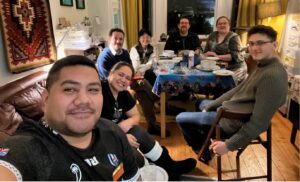
Will Smith connected during the December holidays with his research group members from the CEID class of 2024, Michael Patrick Cairney, Kolotina Halaifonua, Yangguang Guo, and their partners.
Already Published!
- Just published in Comparative Education with Huan Jiang and Xiao Xu (class of 2020) – ‘Where you place the stakes matter: examining the relationship between test-based accountability and shadow education’
- We use multi-level modeling and draw from data from PISA, TIMSS, and UNESCO and find that where you place the stakes for test-based accountability is associated with participation in shadow education.
- Published in 2024 in International Review of Education with Adriana Susu, Ijaaz Jackaria, Johanna Bohorquez Martinez, Meihui Qu, and Misaki Niwa (class of 2023) – ‘Prioritization of indicators in SDG 4: Voluntary national reviews as a tool of soft governance’
- We examine country Voluntary National Reviews between 2016 and 2022 to see how country reporting on SDG 4 reflects the soft governance mechanisms of the SDGs and find that governing by goals encourages participation but governing by numbers often leads to homogenous prioritization.
- Published in 2023 in European Journal of Education with Xiao Xu (class of 2020) – ‘Building public trust in national assessment: the example of China’s NAEQ’
- We use documents from China’s Ministry of Education database to explore how the government has attempted to build trust in the country’s national assessment during its first 5 years of implementation. Findings indicate the assessment is linked to PISA, talked up as an an internationally respected assessment, while specifying it has been adapted to the Chinese context.
- Published in 2022 in the Asia Pacific Journal of Education with Boran Yu (class of 2021) – ‘The relationship between propositional teacher knowledge and classroom teaching practice: the case of Chinese novice mathematics teachers’
- We use data from the 2018 TALIS and teacher interviews to explore the relationship between teachers’ propositional knowledge and their classroom teaching practice in Shanghai. Results suggest a collaborative context is important in transforming results from propositional knowledge into practical knowledge.
- Published in 2021 in International Journal of Multidisciplinary Perspectives in Higher Education with Antonia Voigt (class of 2020) – ‘Inequalities in British university league tables: the Covid-19 pandemic and halo effects’
- We use the halo effect as a framework to understand how the COVID pandemic might influence international higher education league tables. Focusing on the functions of internationalization, research, and teaching, we predict that the gap between top-tier and second-tier universities will widen.
- Published in 2021 as the final report for a Scottish Funding Council GCRF grant co-edited with Antonia Voigt and Yuxin Zhang (class of 2020) – ‘Barriers to Secondary Education in the Asia Pacific Region: A Scoping Review of Four Countries’
- We collaborate with civil society, academia, and UNESCO Bangkok to explore the political, structural, economic, and cultural barriers to universal secondary education in Bangladesh, Lao People’s Democratic Republic (PDR), Mongolia, and the Philippines.
- Published in 2021 in ‘Barriers to Secondary Education in the Asia Pacific Region: A Scoping Review of Four Countries’ with Antonia Voigt (class of 2020) – ‘Access and barriers to secondary education in the Asia Pacific region: an introduction
- We introduce a framework to understand the barriers to educational access and use cross-national data from UIS to review trends in out of school rates across the Asia Pacific region.
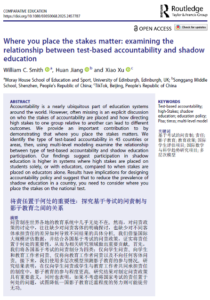
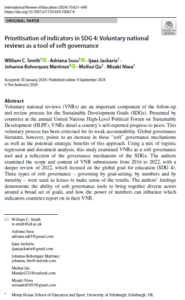
Coming Soon from Last Year’s Research Group!
- In International Organisations Inside Out (edited Book) with Michael Patrick Cairney, Yuchen Liu, Kolotina Halaifonua, Dihang Shen, and Yangguang Guo (class of 2024) – ‘Evidence in evidence-based reports: an insider reflection on the 2017-2018 Global Education Monitoring (GEM) Report’
- We use bibliometric analysis to help reflect on the creation of UNESCO’s 2017-2018 Global Education Monitoring (GEM) Report [which I helped lead]. We found that, sadly and despite the efforts of the GEM Report team, the report was a ‘report with evidence covering countries around the globe, not a report with evidence from around the globe’
Work Currently in Progress!
- Current Research Team of Xi Zhou, Puxin Zhao, Lilly Purich, Suyu Hu, Aiyue Zhang, Lexin Yuan, and Maia Madani Davies (class of 2025) & Fatih Aktas (CEID Faculty) – ‘The Global Testing Culture and the COVID-19 Pandemic: Reversal or Reinforcement’
- We are conducting a comparative analysis of media in Hong Kong and Singapore to examine how tests were discussed during the COVID-19 pandemic and how this discourse rejects or reinforces the Global Testing Culture.
- Funded research project with Emily Goldstein (class of 2024), Rian Matsui (class of 2024), Juliana Sofia Riano (class of 2023), and Linjie Zhang (class of 2021) as well as Sarah Austin (CEID PhD, class of 2024) and CEID Research Group members and faculty, Fatih Aktas, Michael Gallagher, Andie Reynolds, and Daniel Shephard – ‘Access and Completion in Primary and Secondary Education: A Global Systematic Review’
- We are conducting a global mixed methods systematic review exploring the barriers to primary and secondary education access and completion and the policies and interventions that help overcome the barriers.
